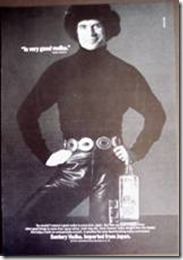There are many wonderful brands all over the world, some which may not be so well known here in the US. One such brand is Suntory, a very successful Japanese brand of whisky that fueled the growth of a strong global company.
Shinjiro Torii, Entrepreneur and Suntory’s creator, started the company, making wine, at the turn of the 20th century. In 1923, he built a whisky-making facility in Yamazaki. He believed that this drink (not known in Japan) could be a success. Torii, like many successful consumer marketers, also believed in the power of branding and telling a  story to the consumer. Suntory was one of the first Japanese consumer product goods companies to embrace Western advertising techniques – using high levels of television and magazine advertising to build awareness.
story to the consumer. Suntory was one of the first Japanese consumer product goods companies to embrace Western advertising techniques – using high levels of television and magazine advertising to build awareness.
Consumer Target and Consumer Insight
Suntory’s brand success came after WWII when it focused its whisky’s marketing message toward the “salaryman” – the company man who worked tirelessly by day and was expected to be out in the evening with coworkers drinking and partying. Suntory likely believed that the salaryman saw himself as this century’s “warrior”, building a new economic powerhouse that would one day surpass the economies of the world. The insight might have been that the warrior, feeling a personal sacrifice, gave his all for a greater purpose. Suntory built an emotional and inspiring message about the whisky, and the man who drinks it. Advertisements used successful, well known personalities, sharing inspiring, vulnerable moments (maybe similar to that of the mysterious Japanese warrior).
Akira Kurosawa produced a series of famous commercials featuring celebrities such as Sean Connery, Peter Lawford, Peter Falk and many other. While this approach is a bit dated today, it established strong credibility for Suntory.
A famous product placement based on these successful commercials came in the 2003 movie, “Lost in Translation” where Bob Harris (actor Bill Murray) goes to Japan to film a Suntory advertisement:
Suntory remains the number one brand of alcoholic beverages in Japan (having also acquired Kirin beer) and is winning awards around the world for, both, its whisky and advertising. Suntory has also gone on to purchase non-alcoholic beverages, Pepsi bottling companies, food companies, restaurants and even flowers. Still, everything they do is rooted in great imagery and emotional connection – never giving up a belief in the power of advertising. Suntory told the Japanese man a story built on deep insight and used the power of emotional advertising to lay the groundwork of a thriving $12 billion global business today.
So what do we learn from Suntory’s approach today? Marketers today are gravitating away from traditional advertising towards social media in a search for brand loyalty. Loyalty, therefore becomes ever more fleeting, especially given the length of time these quick messages last. Suntory, like many great brands, was built on emotional imagery at a time when it was not in step with the fashion of business to use western advertising techniques. Building a brand is based upon a deep understanding and insight into your target consumers’ motivations. The results of this hard work can be inspiring and lasting








[…] 5. https://24kmarketing.com/2011/07/suntory-advertising-that-built-powerful.html […]